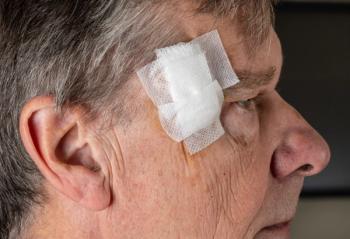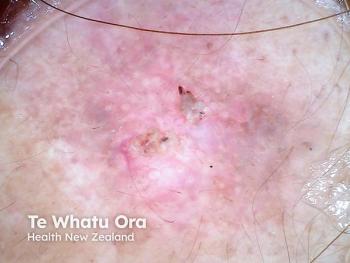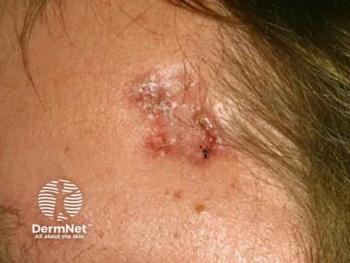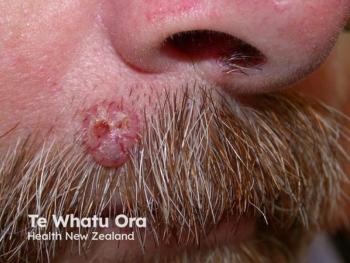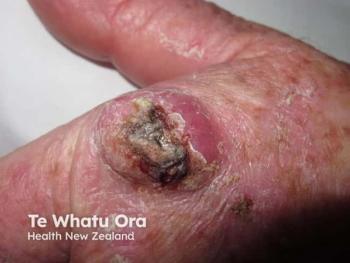
Remetinostat Demonstrates Clinical Efficacy in BCC
A phase 2 clinical trial on remetinostat for the treatment of BCC in adult patients has been published in the Clinical Cancer Research journal and shows promising results.
Remetinostat (Medvir AB), a topical cream and a first-in-class inhibitor of histone deacetylation, has demonstrated clinical efficacy in patients with basal cell carcinoma (BCC) according to results from a phase 2 clinical trial (NCT03180528) published in Clinical Cancer Research, a journal from the American Association for Cancer Research.1
Kavin Sarin, MD, PhD, senior author of the study, associate professor of dermatology at Stanford University, explained that while BCC is not typically deadly, it is usually treated by surgical excision which can be costly and burdensome for the patients, especially if they have multiple tumors. An alternative treatment is a topical cream, but existing topicals are only effective for superficial subtypes of BCC, so more widely applicable treatments are needed, Sarin explained.
Sarin and other researchers wanted to investigate a histone deacetylase (HDAC) inhibition treatment for BCC. This phase 2 trial was created to evaluate the safety and efficacy of remetinostat, a HDAC inhibitor, in adult patients with BCC. Remetinostat was chosen as it is designed to lose potency after it is absorbed into the skin and has a more targeted approach.
The study enrolled 30 patients that were diagnosed with at least 1 BCC measuring 5 mm or greater in diameter. Ninety percent of the patients self-identified as non-Hispanic white and almost 50% had a past medical history of skin cancer. Though only 30 patients were enrolled, 8 patients had multiple eligible tumors, so a total of 49 tumors were included in the trial data and the tumors were discovered in both sun exposed and non-exposed parts of the body with many having either nodular or superficial histology.
Patients applied remetinostat gel to the tumors 3 times a day for 6 weeks, and after 8 weeks any remaining tumor was surgically removed and taken to be examined histologically.
Results found that of the 33 tumors included in the final analysis, 69.7% responded to topical treatment, 17 of which responded completely and 6 partially responded. The average tumor diameter decreased by 62.3% and the tumor area decreased by 71.5%.
When broken down by subtype, 100% of the 6 superficial BCC tumors responded, 5 completely and 1 partially. Of the 22 nodular BCC tumors treated, 68.2% responded, 10 completely and 5 partially. Finally, 66.7% of the 3 infiltrative BCCs responded, 2 completely. None of the 2 micronodular tumors responded to treatment.
No serious adverse events (sAEs) were reported, and the most reported AE was eczema-like skin reaction at the site of application.
“While further research is needed, our results suggest that remetinostat could be a safe and promising alternative to surgical treatment of BCC due to the high rate of complete responses we observed,” said Sarin. “However, if a therapy is to replace surgical treatment, it needs to not only induce a complete response, but also a durable one.”
Future trials will examine the longevity of the response to remetinostat, Sarin noted.
Disclosure:
The study was supported by Medivir AB, the Damon Runyon Foundation, the National Cancer Institute, the American Skin Association Medical Student Grant, and Stanford Medical Scholars. Sarin declares no conflicts of interest.
Reference:
1. First-in-class histone deacetylase inhibitor gel shows promise for the treatment of patients with basal cell carcinoma | aacr | news releases. American Association for Cancer Research (AACR). Accessed August 10, 2021. https://www.aacr.org/about-the-aacr/newsroom/news-releases/first-in-class-histone-deacetylase-inhibitor-gel-shows-promise-for-the-treatment-of-patients-with-basal-cell-carcinoma/
Newsletter
Like what you’re reading? Subscribe to Dermatology Times for weekly updates on therapies, innovations, and real-world practice tips.

